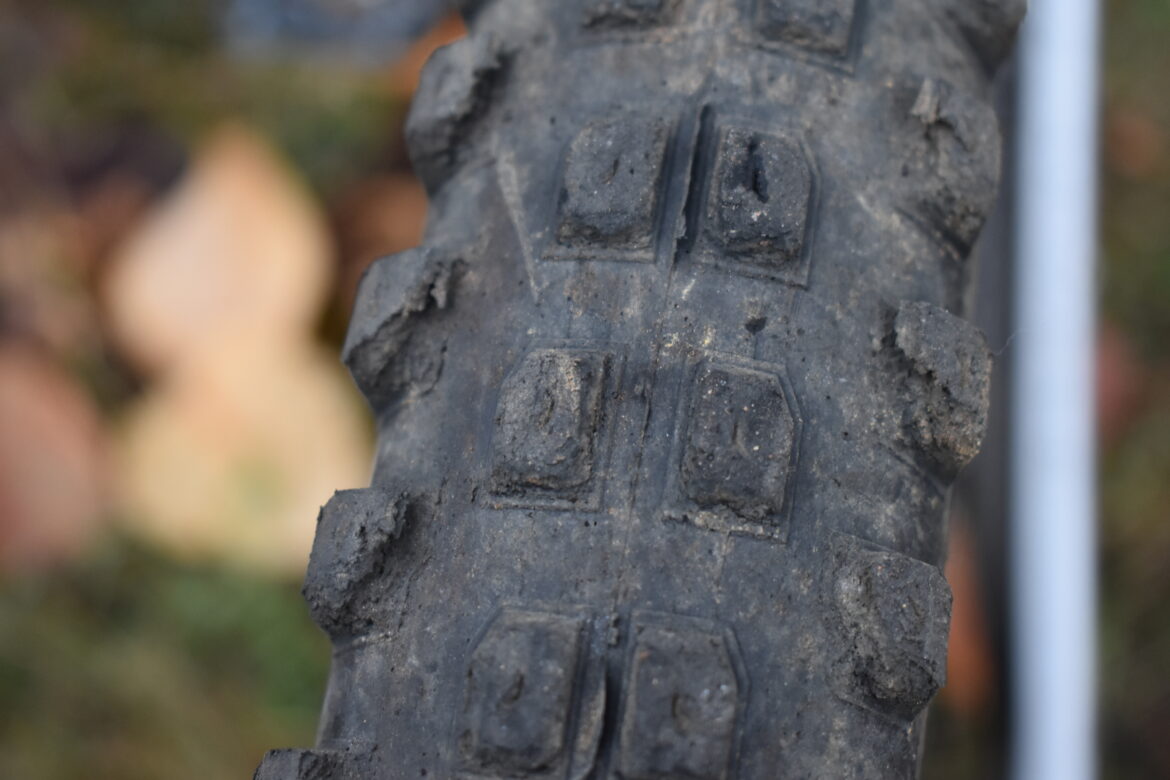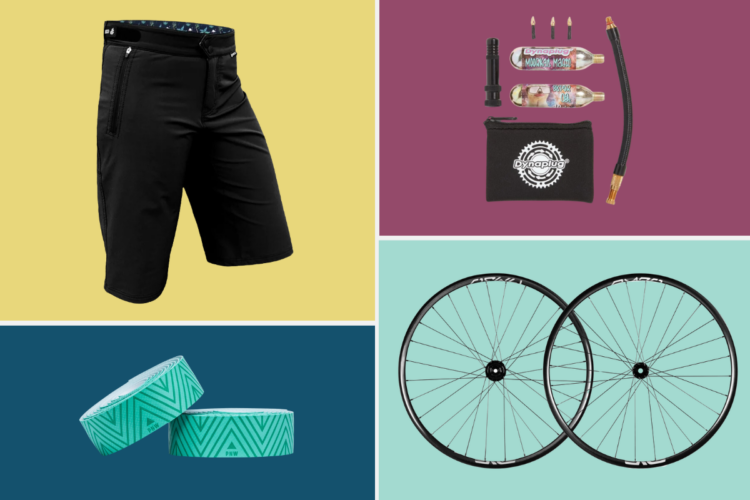The Delium brand is a new player in the tire business, sort of. The company is based in Indonesia, and they say that they’ve been producing bicycle tires and tubes since way back in 1970, under the name Deli Tire, and for other tire brands that they don’t mention. The in-house Delium brand is focused on producing high performance bike tires for an affordable price. You’d think that since they’ve been in business for so long they’d know a thing or two about tires, so we decided to give their Rugged and Versatile Adventure tires a try.
I first spotted these mountain bike tires at Crankworx earlier this year, and after learning the price I was intrigued to try them out. Priced at $48 for their all-round casing, and $58 for their reinforced casing, they’re about 40% cheaper than a Maxxis tire, which is quite the savings. If they perform anywhere near as good, then it’s a no-brainer, right?
The Delium tire line

Delium has only four tires in their line-up currently, keeping things un-complicated and easy. At the XC end of the spectrum they have the Fast and the Steady tires (yes, those are the model names) available in their Light and All-Round casing options, and then the Versatile and Rugged (again yes, these are model names) available in their all-round and reinforced casings. In terms of tire size, the Rugged and the Versatile are available in both 27.5″ and 29″ and only one width option, 2.5″. On test here we have the 29×2.5″ Versatile and Rugged tires, both in the Reinforced casing.
Tire construction
The reinforced casing has what Delium calls a ‘Triple-Zone’ construction, where it’s thin and supple on the top with extra reinforcement in the sidewalls for cut protection. There’s also an impact protection strip down by the bead to prevent pinch flats and to protect the rims. This is an interesting idea, and when the tire is off the rim the protection strip, roughly half an inch wide, is clearly visible and definitely gives the tire some visual toughness.

Delium offers three different compound combinations that are easy to understand. All of their side-knobs are always softer than the center tread, and how soft they are depends on the casing. Each casing only has one compound option, so the Light casing has their ‘Medium Dual-Compound’, the All-Round casing has their ‘Soft Triple-Compound’ and the Reinforced casing has their ‘Extra-Soft Triple-Compound’. That is to say the lighter the tire, the harder the compound and the heavier the tire, the softer the compound. Makes sense. My test samples are the heaviest, most aggressive tires with the softest compounds, designed for DH and enduro use. On paper they should be perfect for the gnarly trails of BC.

Tire setup
The Delium Rugged and Versatile tires were pretty unremarkable in their setup, though I am fortunate to have an air compressor at my disposal. Getting them onto the rim was no drama, even with a CushCore. They seated easily and since installation they have held pressure pretty well, only dropping a couple of PSI in between rides. Since the Rugged tire has a wider knob spacing and more aggressive tread pattern I chose to run this on the front with the Versatile on the rear, as it seemed to have better characteristics for rolling resistance. Off the bat they look pretty promising, with tread patterns that are similar to some other big names in the tire game.


On the trail
On the trail, the Delium tires felt relatively sorted early on. It’s clear some R&D has gone into these tires and they gave a good feeling of confidence. On the climb the Versatile on the rear felt grippy enough to power up technical climbs and at my usual pressures of 22psi rear and 20psi front, neither tire felt overly draggy on fire road or road climbs where they felt plenty efficient. That said, the Versatile on the rear sometimes lacked the ability to put down quick power on quick up-and-over type maneuvres like a dedicated rear tire might.
The Delium Rugged tire on the front gives good grip with big tall knobs and that aggressive spacing, and tends to work best in looser trail conditions like loamy and dusty trails rather than hardpack trails. It hooks up well pushed hard into rutted corners, but on wider flow trail type corners I felt a tendency for both tires to struggle to find grip and found they lost traction more frequently than I’d have liked. Traction under braking was always good with a solid leading edge on both tires and I didn’t often find that they were prone to skidding. The Rugged tire up front rarely lost grip under braking.
Having spent a lot of the time riding in dry conditions lately, the Delium Rugged and Versatile tires seemed to actually fare a little better when the weather went south and the rain showed up. Maybe it’s the tall knobs on the Rugged struggling to cut through the firm trail conditions but once things got sloppy, they seemed to make a little more sense, hooking up well on wet roots and rocks and grabbing hold of softer ground better than firm. That said, they were still a little unpredictable in the corners and left me hesitant to lean the bike over as much as I normally might.
The Reinforced casing on these tires may be billed as their DH and enduro casing, but if we’re comparing to other big brands, it rates about at a Maxxis EXO+ both in terms of weight and the suppleness of the casing. While the protection strip at the bead is no doubt helpful and I never did get a puncture on these tires, I found myself bottoming the tires out and pinging my rims pretty frequently, which doesn’t create a great riding experience. I did blow up a rear Reserve rim on these tires, admittedly on a tiny feature, and who knows if the tire is to blame or not. I rode out thanks to the CushCore, refitted everything to the new rim, and the tire continued to hold air. I do think for really aggressive riding, the Reinforced casing doesn’t quite cut the mustard.

Longevity
I managed to get about 250km of BC Sea To Sky riding out of these tires, but I found that the Versatile tire on the rear lost all of its sharp edges within the first couple of rides, and was due for replacement in my book a good 50-100km ago. I’m not a hugely heavy guy at 170lb, and while I consider myself a good rider, I’m certainly not a tire shredder, nor am I a corner shralper, but I found that the side knobs on the Versatile tire on the rear started falling apart early on, and the tire lost much of its sharp-edged bite quite quickly. This might be the reason why the tires felt a little uninspiring in the firmer corners. The center tread also rounded off pretty shortly thereafter which made a notable decrease in straight-line grip, particularly on technical climbs where I would find myself spinning the back wheel a lot more frequently.
Not only this but the sidewalls started showing signs of wear fairly early on with the threads showing through the rubber pretty fast. While this is admittedly the softest compound Delium offers, I’ve frequently had better longevity from many other name-brand tires in similar compounds, with a rear usually lasting me somewhere between 350-500km. Granted the Rugged tire on the front still had good life left in it after the same test period, though this is always the case with front versus rear. Either way Delium definitely falls a little short of the mark in terms of longevity.






Pros and cons of the Delium Rugged and Versatile mountain bike tires
Pros
- Cheap
- Bead protection seems to work
- Work well in wet/loose conditions
Cons
- Casing options not very supportive
- Short life span
- Not as well refined as the big brands
Conclusion
The Delium Rugged and Versatile tires are an extremely attractive value proposition, with good performance out of the box that is somewhat comparable with other big-name tire brands. They have decent cornering grip when new, and roll well enough with good grip in adverse conditions, however I think the rubber compounds and casing options need some work for them to make sense.
These tires might be almost half the price of a high-end tire, but if they only last half as long, is that truly a good value? The phrase ‘you get what you pay for’ accurately sums these tires up, and if you’re looking to save money on a bike that doesn’t get ridden aggressively/frequently then these would work fine, perhaps more so in the cheaper/firmer compounds. But serious riders are likely better off sticking to the bigger, more established brands. While these are not bad tires, they’re certainly not great and personally I’d prefer to spend the extra money on longer-lasting tires.
Party laps
- Cheap
- Bead protection seems to work
- Work well in wet/loose conditions
Pros and cons of the Delium Versatile and Rugged mountain bike tires.
Dirt naps
- Casing options not very supportive
- Short life span
- Not as well refined as the big brands
















